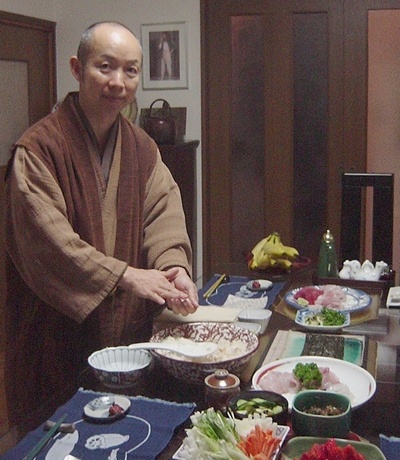|
The Venerable Yamane’s Discourse on the Wisdom When our lives are established on a faith in the teaching of Nichiren Daishōnin, there are two essential components. First is 1) seeing life as it is manifested in our present bodies in which all worldly things are transitory since they are suspended in time and space. This was the underlying motive for the teachings of Shākyamuni that were expounded prior to those of the Dharma Flower Sutra (Hokke-kyō). Second is 2) the perception of our lives that all that takes place in our minds and the various levels of consciousness (shinshiki) are boundlessly eternal and go far beyond any concept of time and space. It also implies an awareness of the cause that concurs with Utterness (Myō) that leads to the awakening of Buddhahood. This means that we acquire the wisdom to comprehend that we are destined to be encompassed by a universe that is forever-changing and impermanent. This is the motivation for Shākyamuni’s graded pre Dharma Flower Sutra (Hokke-kyō) teachings. We are inevitably immersed in an ever transient universe, which is the origin of our fundamental insecurity. Nevertheless, through an enquiring mind of faith, we can become aware of the absolute and eternal quality of our respective existences, and, in this way, we come into possession of the positive understanding that underlies our lives are an infinity of space and time. This is the wisdom that underlines the Dharma Flower Sutra (Hokke-kyō). Therefore, if we look at this carefully, then through our wisdom that stems out of our faith and veneration, the stark reality that is right in front of us is perceived as the inherent workings (hōri) of the Utterness of the Dharma (Myōhō, Saddharma), and the interdependence of cause, concomitance and effect are what has brought into play all the things that go wrong in our lives. The afflictions or worrisome elements in our lives are the outcome of the interdependence of cause, concomitancy and effect. These elements are not seen as the activity of the mind and the adherence to our egos, which are the cause of all pursuits that in turn are the causes of all suffering. [This is manas or the seventh consciousness (mano).] When all our various obstacles and obsessions are seen in terms of the undefiled consciousness (amara shiki, amala-vijñāna) as a part of the workings of the whole of existence (Myōhō), then this is seen as the mechanism that brings about the interdependence of cause, concomitancy and effect that our individual realities entail. This becomes the source of the subjective wisdom to perceive the objective environment (kyōchi) of our human trials and endeavours. Therefore, on the basis of our newly found way of seeing things from the point of view of the ninth consciousness (amara shiki), we begin to realise that our respective realities arise from the cause, concomitance and effect that are brought about from the workings of the Utterness of the Dharma (Myōhō, Saddharma). This leads to the fruition of Buddhahood. In this way, the various endeavours and trials in our lives are built upon the objectivity of the subjective wisdom, with regard to an eternity that is immeasurable. Such a state of mind comes about through the cleansing of our lives through our daily practice (gongyō) and the recitation of the title and theme (daimoku). This awareness of seeing things in terms of the Utterness of the Dharma (Myōhō, Saddharma) becomes creative, and we come to realise our involvement in a practice that consists of our infinite attachment to the interdependence of cause, consistency and effect that perpetuates throughout the whole of existence. All this finalises as a revolution, in which reality is understood as the interdependence of cause, concomitancy and effect of an unlimited existence. In other words, this becomes the radiance of the Utterness of the Dharma (Myōhō, Saddharma), along with the resolution to reflect it by improving our lives in the same way as a lotus plant arrives at its splendour. When we recite Nam Myōhō Renge Kyō, Nam is the expression of our determination; Renge is the lotus-like interdependence of cause, concomitancy and effect of the unlimited space and time, Kyō of the whole of existence. Hō refers to that existence and Myō its entirety. October 2010 |
|

